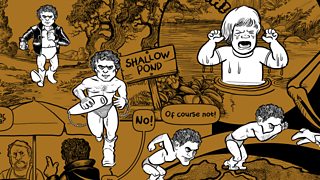5 Modern Dilemmas Philosophy Can Help With
Which 5 Philosophy animations help us get to grips with 2015 issues? Patrick Evans shares his recommendations.
Is it ok to fake it on Facebook?
When did you last manage a day without checking Facebook, Twitter or Instagram?

And with each tweet, share and status update, we’re all confronted with the same question – am I really being myself?
Now, I’m sure that all your posts are effortlessly authentic expressions of who you really are, but where can those of us too insecure to let our innermost selves out into the blogosphere turn for some philosophical advice?
"The sociologist Erving Goffman reminds us that our tendency to craft our identities is not just a part of our virtual lives, but is a part of all spheres of life. According to Goffman everything we do is an act of some sort. We have our "front stage" persona and our "back stage" one as well.
There is no authentic 'you' behind the mask. You are the mask. Embrace it and don’t worry about a bit of impression management on social media – it’s really just the tip of the iceberg.
How to deal with the Trolls?
You've written a new blog-post detailing your take on this year's Bake Off contestants. Proudly, you hit share, releasing your musings into the ether.

Barely a second passes before someone launches an attack on your piece so vicious and personal you're left stunned. Gasping and panic-eating blueberry muffins you think: What should I do?
Well, you could fight fire with fire and burn your detractor with a few scorching remarks. Or, better still, report their abusive behaviour to the authorities and let them teach the guy a lesson. If you're lucky, maybe their employer will get wind of it and sack them.
After such a public shaming they’re bound to come round to accepting the wisdom of your analysis.
John Locke took a different view. He argued you can’t change someone’s mind by force. Even if your troll publicly retracts their attacks, they may well still believe they were in the right. Perhaps meeting their bile with patient tolerance is your best hope to change their mind.
Or, in other words, don’t feed the troll.
Should I want to change society?
I think society needs some shaking up.

Cyclists should be given priority, philosophers should make all the decisions and my parent's house should be exempt from inheritance tax. I'd say that's a pretty reasonable list.
You might say that of course I support these changes as they would all benefit me. Other folk would be less than happy.
People are different and want different things. Is it even possible to make any changes to society that would leave everyone happier?
John Rawls has a helpful thought experiment. Ask yourself how you'd shape society if at any moment you might randomly change places with someone. You might end up in the shoes of someone rich, poor, black, white, disabled, young or old. Rawls called it the veil of ignorance.
He reckoned it’s likely you’d hedge your bets for a system where most people do ok rather than one skewed in favour of a particular group. After all, if you’re born outside that group life could be pretty miserable.
Does it matter GCHQ look at my intimate photos?
Privacy online? Dream on. We now know if you’re looking at something online there’s a good chance the security services are watching it with you.

That’s outrageous you might say. The contents of a person’s history folder should be theirs and theirs alone. But before you grab your mouse and get ready to sign another online petition – consider Thomas Hobbes.
He’d argue in an age of increasing uncertainty and ever more sophisticated dangers it’s right the government should have more powers.
If their snooping means they are able to stop terrorists and cyber-attacks then it's a small price to pay.
Should I care?
It seems like there’s a new cause popping up on your newsfeed every day. Your inbox is full of countless emails asking you to sign this and sponsor that. A read of the news is just a catalogue of tragedies unfolding throughout the world.

We’ve never been so painfully aware of the plight of others all around the globe. Perhaps it’s ok to switch off a bit. Charity begins at home it’s said. Better to help those nearest us first.
Peter Singer thinks otherwise. He‘d ask what the difference is between saving a child drowning in front of you and paying money to save a sick one elsewhere. A life is a life, there’s no rational difference.
So perhaps the more you hear about the world’s suffering the more you should be getting out your credit card.











